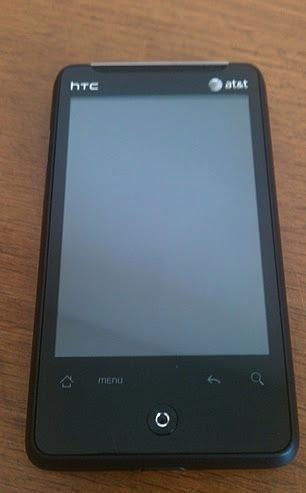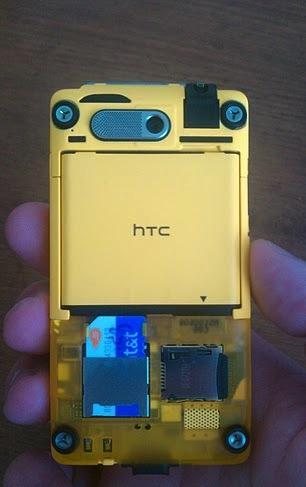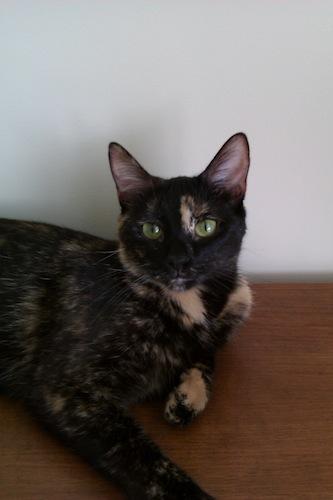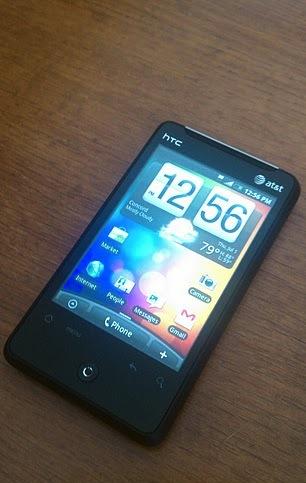
I've been working with the pint-sized HTC Aria for most of the morning, and have to say - I'm really impressed thus far. Despite the fact that it's powered by a 600 MHz processor (versus the 1 GHz processors in today's high-end Android devices), it runs smoothly and without issue. If you're familiar with HTC's global line, the Aria is essentially an HD Mini with Android 2.1 instead of Windows Mobile 6.5.3.
I'm not sure how much of this is me experiencing overload from working with the EVO and Galaxy S' of the world, but when I pulled the device out of the box, my first thought was "wow, this phone is smaller than I thought it would be." In the specs department, you're working with a 3.2-inch HVGA display, 512 MB ROM, 384 MB RAM, a 5.0-megapixel camera, and Wi-Fi connectivity. The Aria measures in at 4.09 inches long by 2.27 inches wide by 0.46 inch thick, and tips the scales at 4.06 ounces, making it perfect for a small pocket. Simply put, the Aria is tiny, and the overall shape of the device contributes to the feeling even more. AT&T includes an AC adapter, USB cable, 3.5mm headset, and 2 GB microSD card.

Just like the HTC DROID Incredible and EVO 4G, the Aria offers a different color under the battery door - but this time, it's bright yellow instead of red. Unlike the other devices that have a color ring around the camera, you don't see it from the outside at all - it's completely hidden until you remove the battery cover. The Aria runs Android 2.1 with HTC's Sense UI, and given the processor limitations, it's surprisingly fast. Unfortunately, you can't install non-Android Market apps, which may be a sticking point with some. With a smaller display comes a smaller on-screen keyboard, and the one on the Aria isn't made for large hands. I'm getting used to it, but coming from reviewing the 4+ inch behemoths on the market, I'm a bit spoiled by the roomy touchscreen keyboards they offer.

The Aria rocks a 5.0-megapixel camera and pictures were still surprisingly good, thanks to autofocus. It's important to note that every test picture I've taken has been in the light, so I expect the lack of a flash to have an impact on pictures taken in the evening. I've been reviewing the device in the Charlotte metro area, and thus far, call quality has been strong. I took it to a known AT&T dead spot this afternoon, and was able to complete a call, despite having one bar of service. Throughout the morning, my callers told me they could understand me well, and audio was good on my end as well. I'm still testing the speakerphone, but my initial thought is that it's quieter than most smartphones. Combine that with the fact that the speaker is flush with the battery cover, and you could have a problem using speakerphone on the desk.
I haven't had it long enough to analyze battery life, but it seems to be on par with other Android devices on the market. With moderate to heavy use including calling, text messaging, e-mailing, use of widgets, browsing the web, and using data-heavy apps, I've dropped by about 28 percent in four hours. If you're coming from another platform to Android, you'll most likely be surprised with how quickly the battery drains. If you're used to Android and you're migrating from another Android device to the Aria, I think you'll notice that it's slightly better than it's robot brethren.
The phone offers HSPA 7.2 connectivity, so browsing was relatively snappy. The mobile CNN page loaded in about nine seconds, and PhoneDog's full website loaded in about 20 seconds. Apps downloaded from the Android Market loaded without a hitch. My favorite app - Google Maps - has been quick to update and has worked well thus far.

Is it going to stand up to devices like the DROID X, Incredible, EVO 4G, and Galaxy S line? No, but the Aria has some nice features that distinguish it as a great mid-range choice on AT&T. Android 2.1 and Sense UI work flawlessly with little to no lag, the 5.0-megapixel camera takes good pictures (given the right amount of light), and the 600 MHz processor powers the unit admirably. If you were turned away from Android by experiences with last year's mid-range devices like the HTC Hero or DROID, I would strongly advise you to take a look at these. Despite the close processor speeds, they're nothing alike.
What I like:
-Despite having a 600 MHz processor, the Aria has performed flawlessly, with no lag whatsoever.
-Android 2.1 and HTC's Sense UI provide what I believe to be the best consumer Android experience. That experience is no different here.
-AT&T includes a 2 GB microSD card.
-Nice little change (no pun intended) in a sea of huge phones.
-The optical trackpad.
What I don't like:
-I wish the camera included a flash.
-Battery life could be better, though it's really on-par with other Android devices.